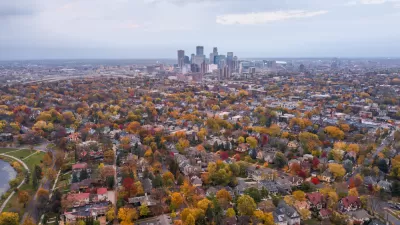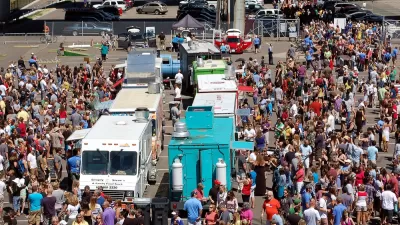Minneapolis wants to diversify its neighborhood organizations, racially and economically. The Neighborhoods 2020 plan would require those organizations to meet diversity standards.

Two articles provide background and details on the Neighborhoods 2020 plan under consideration in Minneapolis—an effort to diversify the city's neighborhood organizations and rescind some of the land use controls in the hands of homeowners.
"Now that the controversy over the much-debated Minneapolis 2040 plan has started to subside, another dispute is starting to build over a new city missive known as Neighborhoods 2020," according to an article by Iric Nathanson.
Nathanson writes to put the Neighborhoods 2020 plan in context of the land use politics of the past and the present in the city.
Neighborhoods 2020 represents the most recent effort by city officials to rein in the independent neighborhood groups and make them more responsive to the will of City Hall. This tug of war between City Hall and the neighborhoods has a longstanding history. Its origins extend back to the early 1990s when the city launched its ambitious Neighborhood Revitalization Program.
Nathanson traces the Neighborhood Revitalization Program (NRP) back to its origins as an idea in the 1980s, and the politicians that championed the NRP as a neighborhood revitalization tool in the early 1990s. Eventually, however, the NRP became known as a tool for white homeowners.
In a separate article, Jessica Lee provides an explainer post about the details of the Neighborhood 2020 plan. One especially important point to note: the amount of funding that moves through the organizations, even though they have no official political power. "The city of Minneapolis funnels millions of dollars through neighborhood groups each budget cycle for issues such as housing and development, giving them a role in deciding how to spend that money," according to Lee.
Part of the reason the city has the leverage to reform the city's neighborhood organizations, is because the funding source that empowered the organizations is set to end. "For years, neighborhood groups have collected money from a tax increment district that is set to expire at the end of this year, leaving the organizations with a $4 million budgetary shortfall in 2019 and more next year," writes Lee.

Planetizen Federal Action Tracker
A weekly monitor of how Trump’s orders and actions are impacting planners and planning in America.

Maui's Vacation Rental Debate Turns Ugly
Verbal attacks, misinformation campaigns and fistfights plague a high-stakes debate to convert thousands of vacation rentals into long-term housing.

Cuomo Is the Candidate of Both NIMBYs and Developers. What Gives?
In the New York City mayoral race, odd bedfellows align to preserve the housing status quo.

Amtrak Rolls Out New Orleans to Alabama “Mardi Gras” Train
The new service will operate morning and evening departures between Mobile and New Orleans.

The Subversive Car-Free Guide to Trump's Great American Road Trip
Car-free ways to access Chicagoland’s best tourist attractions.

San Antonio and Austin are Fusing Into one Massive Megaregion
The region spanning the two central Texas cities is growing fast, posing challenges for local infrastructure and water supplies.
Urban Design for Planners 1: Software Tools
This six-course series explores essential urban design concepts using open source software and equips planners with the tools they need to participate fully in the urban design process.
Planning for Universal Design
Learn the tools for implementing Universal Design in planning regulations.
Heyer Gruel & Associates PA
JM Goldson LLC
Custer County Colorado
City of Camden Redevelopment Agency
City of Astoria
Transportation Research & Education Center (TREC) at Portland State University
Jefferson Parish Government
Camden Redevelopment Agency
City of Claremont





























